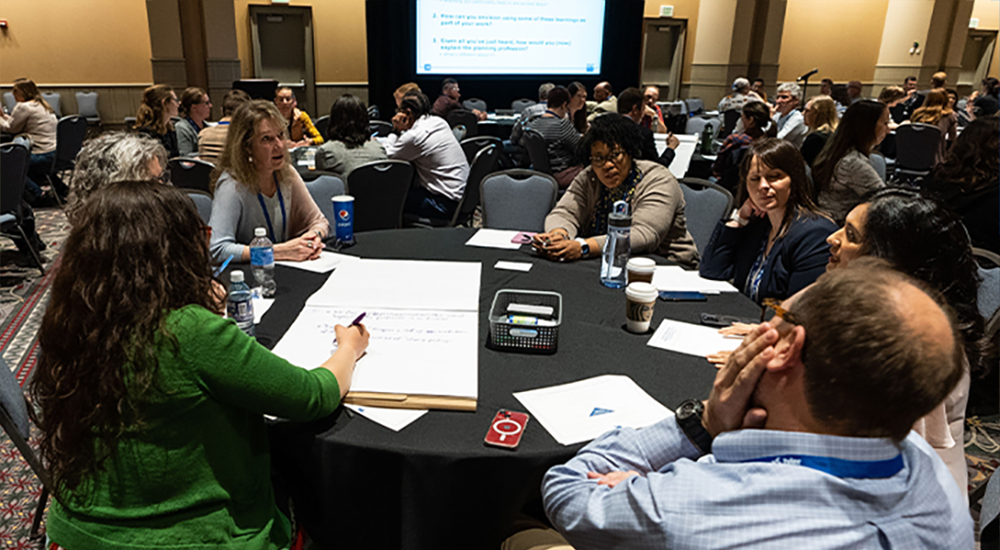It Takes a Planner: Communicating Your Value to Policymakers

Have you ever been in a room with an elected official and realized they don't understand the value of planning? Planners routinely interact with a wide variety of state and local officials, but many report feeling like their elected leaders do not understand or value the expertise planners provide.
That's why APA is launching "It Takes a Planner," an effort aimed at building the influence of planners among state and local elected and appointed officials. It takes a planner to bring long-term vision, data-driven insight, and expert guidance to the decision-making table. Here's how we can make sure planners have a more permanent seat.

Planners from across the country met at NPC23 in Philadelphia to learn messaging tactics for better communicating the value of planning to their state and local elected officials. Photo by Brenna Donegan
Planners Valued by Decision-makers Locally
In 2022, APA conducted extensive market research to learn more about how state and local officials perceive planners and the planning profession.
After months of digital analysis, focus groups, surveys, and one-on-one interviews, research findings demonstrated that while the national narrative about planning is largely critical, there is not an outright rejection of planning overall. Both supportive and critical voices agree that planning is a valuable and necessary tool to enact change at the local level.
Throughout the foundational market research, planners reported feeling unheard by their local and state elected officials. Planners perceived their input to be a matter of checking a box, rather than meaningful engagement with decision-makers over thoughtful, data-driven recommendations.
However, direct conversations with policy insiders — city managers, chiefs of staff, city council members, and more — revealed that most officials have a deep respect for planners and that they have positive impacts on the communities in which they work.
'They influence decisions. Just because a planner brings something to an official, doesn't mean it'll happen, but they see them as experts, not only with information from the research they've done but technical training, and will keep their recommendations in mind in a serious way.'
— Policy Insider
While the national conversation addresses some of the historical wrongs of the planning profession, locally, planners are seen as non-partisan professionals with valuable expertise — despite decision-makers generally limited understanding of the planning process itself.
Planners Gain Respect, Enhance Influence
APA's findings show elected leaders respect planners and the insight they bring more than anticipated. How can planners continue to build that respect and transform it into meaningful influence?
Elected officials understand the value of planning best when they see its positive impact. While there are positive planning outcomes in all our communities, they aren't always easy to put into words.
The key to building influence is to first build consistency in the positioning of planners with their audience of elected officials and to succinctly illustrate the unique value that planners provide to local decision-makers.
To this end, APA has developed and tested a set of key messages informed by last year's findings that have shown success in demonstrating the value of planning to elected official audiences. By emphasizing planners' long-term vision, their data-driven process, and their expert insights and guidance, state and local officials begin to better understand the unique value, skill set, and outcomes that planners bring to their communities.
From city council meetings to one-on-one interactions with a government official, every planner can start incorporating these value messages to build influence with elected and appointed officials in their communities.

6 Tips for Communicating Your Value
Knowing the high-level message is the first step in enhancing your dialogue with local decision-makers and elected officials. But comfort takes practice! Below are additional tips to help make your message more resonant.
1. Keep working on examples of planning outcomes. Start a running list of 'case studies', mention important entities or people that have embraced your recommendations, and keep the conversation focused on real outcomes.
2. Think of your message as storytelling. Always link planning action to community outcomes — don't forget the end benefit and elevate the human, personal impact of your work!
3. Prep ahead of conversations. Think about your audience and what motivates them. Focus on three key points or takeaways you want your audience to remember. Identify expected questions or comments and sketch out your responses.
4. Speak in headlines. Give your conclusions first, then back them up with succinct support points using plain language.
5. When answering questions, don't stay small. Local policymakers need to know you did the research, but they don’t want ALL the details. Prioritize your best proof point.
6. Be confident. Remember that you are an expert, you offer value.
APA Amplifies Planning Voices
Planners who joined us at NPC23 have already begun adapting these messages to their own community experiences.
In the coming months, APA will continue to uplift planning voices and draw attention to positive planning outcomes from across the country. We will also test new ways to bring "It takes a planner" messaging to life on the ground at the state and local levels and arm planners with the tools they need to better tell their own stories — and center themselves as the heroes.

NPC23 Attendees practice applying the tenets of the message triangle to their local planning work to emphasize the data-driven process, long-term vision, and expert insights that planners bring to the decision-making table. Photo Credit: Wiseowl Media
Top image: Designed by Subject Matter


